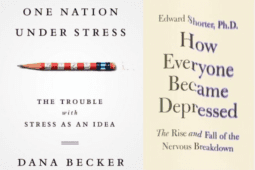Latest
Blue-Collar Therapy
The Nitty-Gritty of Lasting ChangeChanges in the habitual attitudes and behaviors that shape our lives rarely happen as the result of psychological epiphanies or emotional catharsis. Most... Read more
Habits vs. Addictions
What’s the Difference?Some people can drink to excess for years without experiencing the negative consequences that can destroy their lives. So when does someone cross the tenuous... Read more
Creatures of Habit
Do We Really Choose How We Live Our Lives?When routines and habits become as lifeless as the manner in which one brushes one’s teeth, when the choreography of one’s existence resembles a... Read more
Something New, Here & Now
Breaking Free of the HabitualMost clients have automatic habits of thinking, feeling, and verbalizing experiences that imprison them in a world of gray sameness. How do we help them... Read more
The 14 Habits of Highly Miserable People
How to Succeed at Self-SabotageMaking yourself profoundly unhappy takes tenacity and creativity. But the real art of it is to behave in ways that allow you to claim yourself to be an... Read more
Shaking & Dancing in Dharamsala
A Group of Tibetan Refugees Find their Inner GuidesHow do you help 200 teenagers who’ve had to flee their country find a path to peace in a new place? A psychiatrist who’s traveled across the world to help... Read more
Psychotherapy vs. Placebos
Frontline PsychotherapyGarry Cooper and Kathleen Smith Read more
Hearing the Body’s Truth
Three Steps to Connecting to Felt SenseAlthough the idea that the mind and body are inextricably linked is widely accepted in our field, many clinicians remain too focused on words to hear the... Read more
The Black Shadow
Facing the Taboo Issue of Race in the Consulting RoomRaising the issue of race in therapy can help African American clients connect their personal struggles to an enduring cultural legacy that many insist isn’t... Read more
Grief as a Gift
Carrying on the Legacy of Kübler-RossDavid Kessler has spent his career helping people all over the world deal with death. In the process, he’s learned that—as much as we may resist... Read more
Love and Terror
Penetrating the Heart of EvilA new book examines how one man, under the guise of religious faith, kept his family isolated in a world of abuse and brutality, and how another family broke... Read more
Permission to Sleep
Accepting a Long Road to LoveA woman discovers that giving someone permission to sleep can be a deep expression of love. Read more
How to Protect Yourself in the Ethical Gray Zone
Frederic Reamer on the Importance of DocumentationFrederic Reamer explains the importance of documentation and how it can save you from potential legal woes, even when you’re sure you’re in the right. Read more
Editor's Note: November/December 2013
First Comes the Hard WorkRomantically infatuated with the idea of psychological revelation—aka the therapeutic “breakthrough”—therapists too often ignore the fact that a... Read more
How To Talk About Sex With Men
Esther Perel Shows How Easy It Can BeEsther Perel introduces the subject of a man’s sexuality, sexual practice, his approach to sex, and its place in his life in an effortless, organic way. Read more
The Importance of Professional Boundaries in Therapy
As ethical violation guidelines in therapy become more ambiguous, setting clear professional boundaries remains a central concernIncreasingly the general public has come to regard therapists as just another kind of service provider, rather than a potential Svengali. Thus the relative... Read more
Moving Beyond DSM-5
David Mays on the Future of PsychotherapyDavid Mays talks about his disappointment in how medications are currently used and prescribed, the changes he’s seeing taking place, and what those changes... Read more
Male-Friendly Psychotherapy
How Brain Science Illuminates Gender DifferencesPat Love explains how the brain engages and reflects with the emotional state of others and why it comes down to gender. Read more
Examining the Most Controversial Change in DSM-5
Gary Greenberg On The Bereavement ExclusionWhen examining the various changes made in DSM-5, Gary Greenberg finds the most controversial one to be the removal of the bereavement exclusion from the major... Read more
Empowering Today's Parental Authority Figures
Ron Taffel on What Families Can't Function WithoutRon Taffel discusses how Generation X and Millennials handle authority and raising kids differently than their parents. Read more
Taking Off The Gloves
David Schnarch On How Confrontation Speeds Up Couples TherapyCouples therapist David Schnarch shares how speed helps give relationships hope. Read more
Responding to the Critics of DSM-5
Darrel Regier On Why Diagnostic Changes Were MadeDespite the number of criticisms it has incurred, there was a method to the so-called madness of DSM-5. Read more
VIDEO: Anxiety as a GPS
Danie Beaulieu On How to Make Panic An AllyDanie Beaulieu explains how panic can function as the voice of clients’ internal GPS, telling them when they are making a “wrong turn” in their lives. Read more
Rethinking the Autonomic Nervous System
Stephen Porges on a Popular Neuroscientific MisconceptionFor decades therapists have been taught that there are two sides of the autonomic nervous system complementing each other. But according to Stephen... Read more
What's The Value Of A Diagnostic Category In The DSM?
Gary Greenberg on the Role of Economic Factors in the Shaping of the DSMGary Greenberg deconstructs the DSM and how it affects the field and your practice. Read more
Therapist and business coach Lynn Grodzki provides an eye-opening road-map to both the shift in clients’ attitude and how we as therapists can most... Read more
Talking on the Edge
Assessing the Risk of SuicideMost clinicians already know the basic questions to ask about a client’s suicidality, but it’s important to go beyond a rote assessment to get a fuller... Read more
Evoking the Inner Artist: September/October 2013
How to Replace Pathology with CreativityWhen clients feel blocked, therapists can help them tap their inner artist and view feelings of vulnerability, doubt, and fear as part of a creative... Read more
Wearing Your Heart on Your Face
The Polyvagal Circuit in the Consulting RoomPsychophysiologist Stephen Porges’s research on the polyvagal nervous system provides insight into the evolutionary roots of trauma and anxiety, and how... Read more
The Pathologizing of Everyday Life
When Did Sadness Become a Disease?The increasingly blurry distinction between normal and abnormal not only makes us easy targets for Big Pharma’s advertising, but also distracts us from the... Read more


























